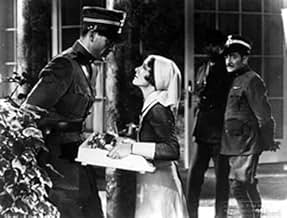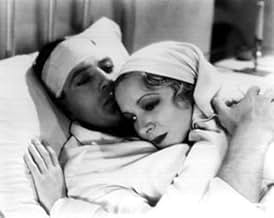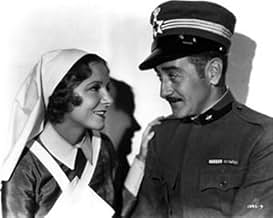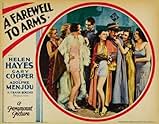AVALIAÇÃO DA IMDb
6,4/10
7,3 mil
SUA AVALIAÇÃO
Adicionar um enredo no seu idiomaAn American ambulance driver and an English nurse fall in love in Italy during World War I.An American ambulance driver and an English nurse fall in love in Italy during World War I.An American ambulance driver and an English nurse fall in love in Italy during World War I.
- Direção
- Roteiristas
- Artistas
- Ganhou 2 Oscars
- 7 vitórias e 2 indicações no total
Alice Adair
- Cafe Girl
- (não creditado)
Henry Armetta
- Bonello
- (não creditado)
Herman Bing
- Swiss Postal Clerk
- (não creditado)
Agostino Borgato
- Giulio
- (não creditado)
Robert Cauterio
- Gordini
- (não creditado)
Marcelle Corday
- Swiss Nurse
- (não creditado)
Gino Corrado
- Italian Soldier
- (não creditado)
Peggy Cunningham
- Molly
- (não creditado)
George Humbert
- Piani
- (não creditado)
William Irving
- Frustrated Opera Singer
- (não creditado)
Avaliações em destaque
Based on the Ernest Hemingway novel and starring Gary Cooper, this has the potential to be a classic. The setting and sentiment are reasonably original, especially for their time, and the movie is reasonably gritty.
Yet, it doesn't feel like a classic. The romance seems trite and contrived. Overly schmaltzy and sometimes just plain dull.
The acting is patchy. Gary Cooper is okay, but Helen Hayes' performance is quite flat. Most entertaining performance comes from Adolphe Menjou as Rinaldi.
It was probably quite good in its time, and might well be regarded as one of the first anti-war movies, but it now feels quite dated.
Yet, it doesn't feel like a classic. The romance seems trite and contrived. Overly schmaltzy and sometimes just plain dull.
The acting is patchy. Gary Cooper is okay, but Helen Hayes' performance is quite flat. Most entertaining performance comes from Adolphe Menjou as Rinaldi.
It was probably quite good in its time, and might well be regarded as one of the first anti-war movies, but it now feels quite dated.
When this version of A Farewell to Arms came out, Ernest Hemingway hated this film. They turned his novel and put too much emphasis on the romance angle. When Papa Hemingway said that he obviously did not know Hollywood well at all. If he did just knowing Frank Borzage directed this film should have told him something. Borzage did a whole slew of tender romantic stories in the Thirties like Three Comrades, The Mortal Storm, stuff like that. A Farewell to Arms is definitely in keeping with that tradition.
The one thing that Hemingway did like was the casting of Gary Cooper as the hero Fredric Henry. He and Coop became fast friends right up to when they both died in 1961. He saw in Cooper the ideal Hemingway hero and when Paramount acquired the rights to For Whom the Bells Toll, Hemingway insisted it be done with Cooper or nobody.
Cooper and Helen Hayes made a tender romantic couple in the Borzage tradition, probably more Borzage than Hemingway. But Adolph Zukor and Paramount also knew what sold movie tickets and Paramount was having a lot of financial troubles at this time. The studio nearly went under during the Depression. But Paramount's saviors turned out to be Bing Crosby, Mae West, and Cecil B. DeMille who returned to the studio he helped found.
Helen Hayes made several good films in the early thirties, this one and the one she won an Oscar for, The Sins of Madelon Claudet. But she never became a movie box office draw so she returned to the Broadway stage where she reigned as a Queen.
Adolphe Menjou replete with Italian accent plays Cooper's friend and romantic rival, Major Rinaldi. Menjou was great at playing both American and continental types. Soon he would sign a long term contract with MGM and gain his greatest roles during the sound era.
Hemingway purists might shun A Farewell to Arms, but those who love their screen romances, soggier the better will rave about this film.
The one thing that Hemingway did like was the casting of Gary Cooper as the hero Fredric Henry. He and Coop became fast friends right up to when they both died in 1961. He saw in Cooper the ideal Hemingway hero and when Paramount acquired the rights to For Whom the Bells Toll, Hemingway insisted it be done with Cooper or nobody.
Cooper and Helen Hayes made a tender romantic couple in the Borzage tradition, probably more Borzage than Hemingway. But Adolph Zukor and Paramount also knew what sold movie tickets and Paramount was having a lot of financial troubles at this time. The studio nearly went under during the Depression. But Paramount's saviors turned out to be Bing Crosby, Mae West, and Cecil B. DeMille who returned to the studio he helped found.
Helen Hayes made several good films in the early thirties, this one and the one she won an Oscar for, The Sins of Madelon Claudet. But she never became a movie box office draw so she returned to the Broadway stage where she reigned as a Queen.
Adolphe Menjou replete with Italian accent plays Cooper's friend and romantic rival, Major Rinaldi. Menjou was great at playing both American and continental types. Soon he would sign a long term contract with MGM and gain his greatest roles during the sound era.
Hemingway purists might shun A Farewell to Arms, but those who love their screen romances, soggier the better will rave about this film.
Watch for some James Dean look-alike glances in this black and white movie. It also plays a lot like "The English Patient", but not as boring. The continual bombings and chaos of the fighting was very realistic, but it didn't move the plot along as well as it might have.
Helen Hayes as the love interest does a delightful job, but it's hard not to judge this picture by the technical improvements of today's cinematographers. I too have either outgrown Hemingway, or a lot of his dialogue was cut. I suggest you go back and give the book a read, and decide for yourself. I have promised to return and see the movie again, afterwards. Gary Cooper was a really great-looking, and good acting guy.....and I've never appreciated him before so much. He had a lot of stage business that made him appear quite natural.
Adolph Menjou as the fun-loving captain did an admirable job, as well.
Helen Hayes as the love interest does a delightful job, but it's hard not to judge this picture by the technical improvements of today's cinematographers. I too have either outgrown Hemingway, or a lot of his dialogue was cut. I suggest you go back and give the book a read, and decide for yourself. I have promised to return and see the movie again, afterwards. Gary Cooper was a really great-looking, and good acting guy.....and I've never appreciated him before so much. He had a lot of stage business that made him appear quite natural.
Adolph Menjou as the fun-loving captain did an admirable job, as well.
Frank Borzage's 1932 version of "A Farewell To Arms" has the distinction of being the first film adaptation of an Ernest Hemingway novel. It's more Hollywood than Hemingway: Long blankets of dialogue are condensed, sharp edges softened, and the romance between Lt. Henry and Catherine made into something more befitting Douglas Sirk than the unsentimental Papa. Yet a surprising amount of the novel's spirit does survive the transition.
In a story not much different than what you might have read in high school, Lt. Henry (Gary Cooper) is an American ambulance corpsman serving with the Italian Army as it fights the Austrians along the Piave, a bloody backwater campaign of World War I. Henry meets nurse Catherine Barkley (Helen Hayes) and they quickly fall in love. But the violence of war, and the interference of friends like Capt. Rinaldi (Adolphe Menjou), threaten to tear them apart.
The differences between book and movie are more in the matter of treatment than storyline. When Catherine and Lt. Henry first meet, they talk about her former lover, a war casualty. In the film, she says "If I had to do it all over again, I'd marry him". In the book, though, Catherine wasn't regretting sending him off to war unmarried, but without their having had sex.
Yet a minute later, her lines come directly from the book, Catherine noting her daydreams about her old lover turning up at her hospital with a saber cut, then adding: "He didn't have a saber cut, they blew him to bits." For Hollywood, violence was always easier material than sex.
Since this is a film made before the inhibiting Hays Code (Will, not Helen), Borzage and his writers are able to get away with a bit more than they would have just a couple of years later. Catherine and Henry still make love, and she gets pregnant.
There IS a lot of Hemingway here. Catherine is a still somewhat mixed-up woman who hates the rain "because I see myself dead in it". The folly of war is openly expressed. "If nobody would attack, the war would be over," one soldier muses. Lt. Henry is wounded, and embarrassed because it happened while he was eating cheese. Even some small exchanges survive, like one between Lt. Henry and a nasty nurse.
She: "Pity is wasted on you."
He: "Thank you."
But the film also strikes out for its own territory, successfully in the case of building up the role of Capt. Rinaldi. Menjou, who had been a real ambulance corps captain in World War I, creates a marvelously ambiguous figure, a cheerful cynic who befriends Henry and is put out by the romance with Catherine. "Why don't you be like me?" Rinaldi asks his "war brother". "All fire and smoke. Nothing inside."
Rinaldi's role here is a change from the original story, a gamble by Borzage and writers Benjamin Glazer and Oliver H. P. Garrett that pays off, devising some needed tension to the central storyline and underscoring the core message of the rottenness of war. If it wasn't for war, Rinaldi might value something more than his next bottle or bedpartner, and Menjou, in a final triumphant moment, lets you know it.
Pacifism, in movies as in life, only takes one so far. The film makes a mistake near the end by more consciously making a stand as an anti-war film, with much hysteria, bells ringing, even Cooper chanting "Peace...peace". It made those points much better as sidenotes, like an opening tracking shot where a seemingly sleeping soldier is revealed to be dead, or later on when Cooper trudges through a muddy path and notices the corpse everyone's been walking on. By contrast, too much of the movie's finale is played for the cheaper seats, and doesn't stand up today.
But the film does stand up better than many later Hemingway adaptations, with its strong cast, inspired tracking shots, and a mostly successful effort by Borzage to translate Hemingway's terse prose style into film. What you get is a short but deep examination of life during wartime.
In a story not much different than what you might have read in high school, Lt. Henry (Gary Cooper) is an American ambulance corpsman serving with the Italian Army as it fights the Austrians along the Piave, a bloody backwater campaign of World War I. Henry meets nurse Catherine Barkley (Helen Hayes) and they quickly fall in love. But the violence of war, and the interference of friends like Capt. Rinaldi (Adolphe Menjou), threaten to tear them apart.
The differences between book and movie are more in the matter of treatment than storyline. When Catherine and Lt. Henry first meet, they talk about her former lover, a war casualty. In the film, she says "If I had to do it all over again, I'd marry him". In the book, though, Catherine wasn't regretting sending him off to war unmarried, but without their having had sex.
Yet a minute later, her lines come directly from the book, Catherine noting her daydreams about her old lover turning up at her hospital with a saber cut, then adding: "He didn't have a saber cut, they blew him to bits." For Hollywood, violence was always easier material than sex.
Since this is a film made before the inhibiting Hays Code (Will, not Helen), Borzage and his writers are able to get away with a bit more than they would have just a couple of years later. Catherine and Henry still make love, and she gets pregnant.
There IS a lot of Hemingway here. Catherine is a still somewhat mixed-up woman who hates the rain "because I see myself dead in it". The folly of war is openly expressed. "If nobody would attack, the war would be over," one soldier muses. Lt. Henry is wounded, and embarrassed because it happened while he was eating cheese. Even some small exchanges survive, like one between Lt. Henry and a nasty nurse.
She: "Pity is wasted on you."
He: "Thank you."
But the film also strikes out for its own territory, successfully in the case of building up the role of Capt. Rinaldi. Menjou, who had been a real ambulance corps captain in World War I, creates a marvelously ambiguous figure, a cheerful cynic who befriends Henry and is put out by the romance with Catherine. "Why don't you be like me?" Rinaldi asks his "war brother". "All fire and smoke. Nothing inside."
Rinaldi's role here is a change from the original story, a gamble by Borzage and writers Benjamin Glazer and Oliver H. P. Garrett that pays off, devising some needed tension to the central storyline and underscoring the core message of the rottenness of war. If it wasn't for war, Rinaldi might value something more than his next bottle or bedpartner, and Menjou, in a final triumphant moment, lets you know it.
Pacifism, in movies as in life, only takes one so far. The film makes a mistake near the end by more consciously making a stand as an anti-war film, with much hysteria, bells ringing, even Cooper chanting "Peace...peace". It made those points much better as sidenotes, like an opening tracking shot where a seemingly sleeping soldier is revealed to be dead, or later on when Cooper trudges through a muddy path and notices the corpse everyone's been walking on. By contrast, too much of the movie's finale is played for the cheaper seats, and doesn't stand up today.
But the film does stand up better than many later Hemingway adaptations, with its strong cast, inspired tracking shots, and a mostly successful effort by Borzage to translate Hemingway's terse prose style into film. What you get is a short but deep examination of life during wartime.
The 1932 film version of Ernest Hemmingway's A FAREWELL TO ARMS will never challenge the likes of ALL QUIET ON THE WESTERN FRONT--but while it fails to capture the horrors of World War I it is remarkably effective at capturing the novel's sparse and unyielding prose. A good deal of the credit goes to writers Garrett and Glaizer and director Borzage--but the real interest here is not so much in the cinematic interpretation of the Hemmingway novel as it is in the cast, which is remarkable.
Actress Helen Hayes was already among the leading lights of the New York stage when she was lured to Hollywood for a handful of films in the early 1930s--and it is easy to see what all the fuss was about. Plaintive beauty aside, unlike most stage and screen actors of the era she is completely unaffected in her performance and proves more than powerful enough to overcome the more melodramatic moments of the script. She is costarred with Gary Cooper in one of his earliest leading roles, and while the pairing is unexpected, it is also unexpectedly good: they have tremendous screen chemistry, and in spite of the film's dated approach they easily draw you into this story of an ill-fated wartime romance between a nurse and an ambulance driver.
The film is also well supplied with a solid supporting cast that includes Adolphe Menjou, Jack La Rue, and Mary Philips, and while clearly filmed on a slim budget--something most obvious in the battlefront sequences--the camera work is remarkably good. Unfortunately, all this counts for nothing unless you can find a print of the film that you can stand to watch. It is sad but true: the 1932 A FAREWELL TO ARMS seems to have fallen into public domain, and the result is a host of DVD and VHS releases that range from the merely adequate to the incredibly dire.
Gary F. Taylor, aka GFT, Amazon Reviewer
Actress Helen Hayes was already among the leading lights of the New York stage when she was lured to Hollywood for a handful of films in the early 1930s--and it is easy to see what all the fuss was about. Plaintive beauty aside, unlike most stage and screen actors of the era she is completely unaffected in her performance and proves more than powerful enough to overcome the more melodramatic moments of the script. She is costarred with Gary Cooper in one of his earliest leading roles, and while the pairing is unexpected, it is also unexpectedly good: they have tremendous screen chemistry, and in spite of the film's dated approach they easily draw you into this story of an ill-fated wartime romance between a nurse and an ambulance driver.
The film is also well supplied with a solid supporting cast that includes Adolphe Menjou, Jack La Rue, and Mary Philips, and while clearly filmed on a slim budget--something most obvious in the battlefront sequences--the camera work is remarkably good. Unfortunately, all this counts for nothing unless you can find a print of the film that you can stand to watch. It is sad but true: the 1932 A FAREWELL TO ARMS seems to have fallen into public domain, and the result is a host of DVD and VHS releases that range from the merely adequate to the incredibly dire.
Gary F. Taylor, aka GFT, Amazon Reviewer
Você sabia?
- CuriosidadesErnest Hemingway hated this interpretation of his novel, as he felt it was overly romantic. That didn't stop him, however, from becoming lifelong friends with Gary Cooper, whom he met several years later. In fact, it was Hemingway who would insist that Cooper be cast in the lead of the adaptation of his novel Por Quem os Sinos Dobram (1943) 11 years later. However, the two made a point of never discussing this film.
- Erros de gravaçãoA night attack is shown. During World War I there was very little flying at night and the night attacks that did occur were limited to big cities. It was almost impossible for a plane to attack specific targets in a large city, so effectively attacking people on a road in the dark was not possible, and did not happen.
- Citações
Frederic: We've never been apart, really. Not since we met.
Catherine: Not since we met.
Frederic: And never can be.
Catherine: Never apart.
Frederic: In life and in death. Say it Cat.
Catherine: In life and in death, we'll never be parted.
Frederic: You do believe that, don't you, Cat?
Catherine: I believe it, and I'm not afraid.
- Cenas durante ou pós-créditosIn the original 1932 credits, the credits are punctuated by aerial bomb blasts, and every time there is a blast, a credit disappears to be replaced by the next one.
- Versões alternativasSPOILER: Paramount decided, after much disagreement, to keep Hemingway's original ending and fade out after the death of Catherine Barkley. This ending was kept for the European release, but a new ending in which Barkley lives was later added to the U.S. release.
- ConexõesEdited into Your Afternoon Movie: Farewell to Arms (2023)
Principais escolhas
Faça login para avaliar e ver a lista de recomendações personalizadas
Detalhes
- Data de lançamento
- País de origem
- Central de atendimento oficial
- Idiomas
- Também conhecido como
- Adiós a las armas
- Locações de filme
- Empresa de produção
- Consulte mais créditos da empresa na IMDbPro
Bilheteria
- Orçamento
- US$ 799.520 (estimativa)
- Tempo de duração
- 1 h 20 min(80 min)
- Cor
- Proporção
- 1.37 : 1
Contribua para esta página
Sugerir uma alteração ou adicionar conteúdo ausente

























